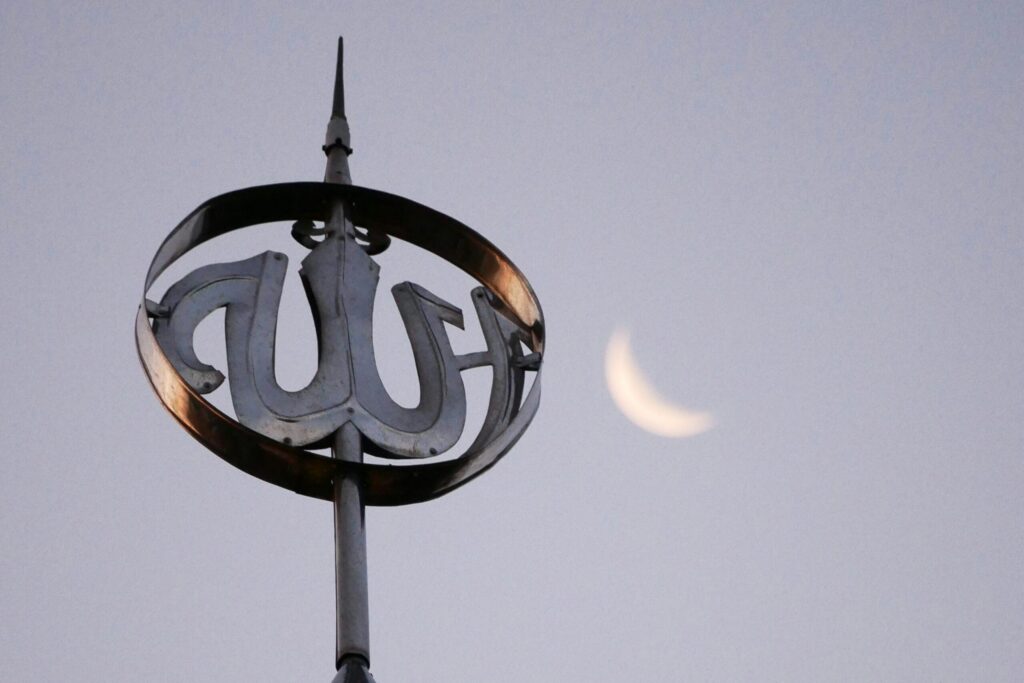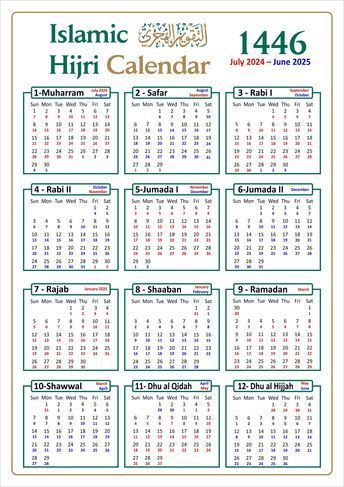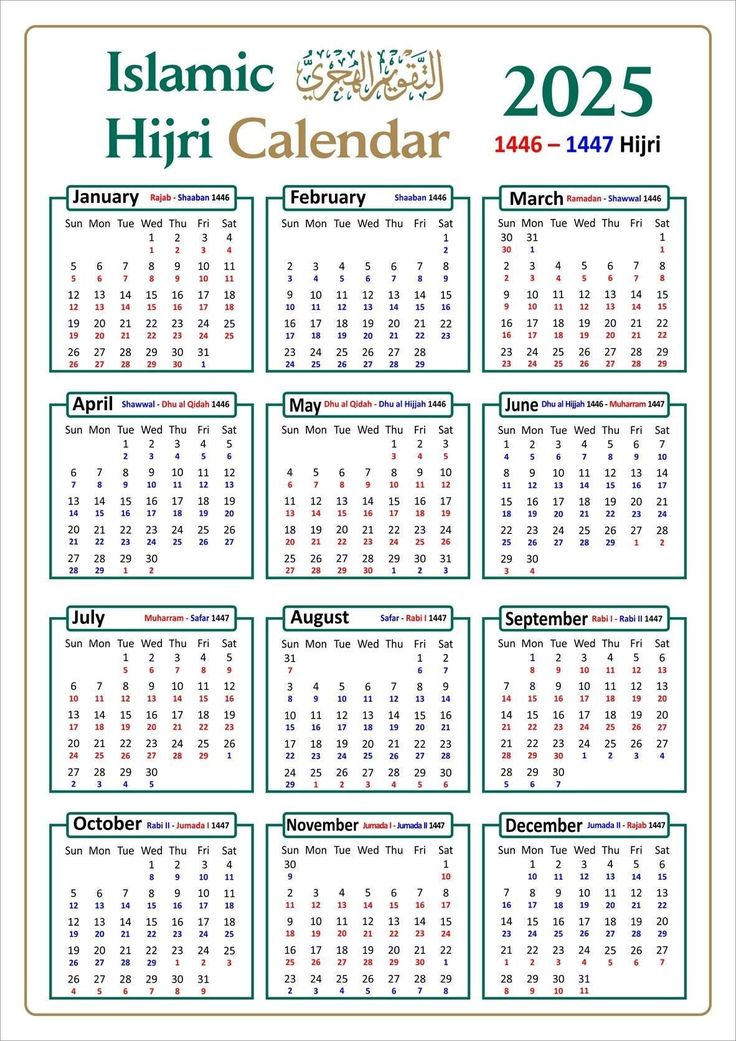Islamic Calendar 2025 – Hijri Calendar:
Introduction to the Islamic Calendar 2025 – Hijri Calendar
The Islamic Calendar 2025 – Hijri Calendar serves as both a chronological system and spiritual guide for Muslims worldwide. Unlike the solar-based Gregorian calendar, the Hijri calendar is purely lunar-based, consisting of 12 months that determine the timing of religious observances, festivals, and sacred periods. As we enter the year 1446-1447 AH (After Hijra), understanding this calendar becomes essential for spiritual planning and religious observance. Islamic Relief UK, as a faith-inspired humanitarian organization, aligns its charitable activities and programs with these significant dates, creating meaningful connections between worship and service to humanity. This comprehensive guide explores the Islamic Calendar 2025 – Hijri Calendar in depth, providing key information about important dates, their spiritual significance, and how Muslims can maximize these sacred moments through both worship and practical action.

Understanding the Hijri Calendar System
The Islamic Calendar 2025 – Hijri Calendar operates on lunar cycles, with each month beginning upon the sighting of the new moon. This system results in a year of approximately 354 days—11 days shorter than the solar year—which causes Islamic months to transit through different seasons over a 33-year cycle. The calendar commemorates the Hijra, the migration of Prophet Muhammad (PBUH) from Mecca to Medina in 622 CE, which marks the beginning of the Islamic era .
The twelve months of the Hijri calendar are in order: Muharram, Safar, Rabi’ al-Awwal, Rabi’ al-Thani, Jumada al-Awwal, Jumada al-Thani, Rajab, Sha’ban, Ramadan, Shawwal, Dhul Qa’dah, and Dhul Hijjah. Four of these months are considered sacred: Muharram, Rajab, Dhul Qa’dah, and Dhul Hijjah, during which warfare is traditionally forbidden and worship is especially encouraged .
The lunar nature of the Islamic Calendar 2025 – Hijri Calendar means that exact dates may vary slightly depending on moon sightings in different locations, though many organizations including Islamic Relief provide calculated dates to help with planning while acknowledging that local sightings may take precedence .
Key Dates in the Islamic Calendar 2025 – Hijri Calendar 1446-1447
The Islamic Calendar 2025 – Hijri Calendar contains numerous significant dates that dictate religious observances and celebrations. Here are the major Islamic events for 2025 according to astronomical calculations:
It’s important to note that these dates may vary by a day or two depending on moon sightings in different regions. Muslims are encouraged to confirm exact dates with their local Islamic authorities.
The Spiritual Significance of Hijri Months
Each month in the Islamic Calendar 2025 – Hijri Calendar carries unique spiritual significance and opportunities for worship:
Ramadan (March 1-30, 2025): The holiest month in the Islamic calendar, Ramadan requires fasting from dawn to sunset and increased spiritual devotion. It commemorates the revelation of the Quran to Prophet Muhammad (PBUH) and offers Muslims an opportunity for spiritual renewal, self-discipline, and increased empathy for those less fortunate .
Dhul Hijjah (May-June 2025): The month of Hajj, the annual pilgrimage to Mecca that represents one of the Five Pillars of Islam. The first ten days of Dhul Hijjah are considered especially sacred, with the Day of Arafah (June 5, 2025) being the most significant day of the Hajj pilgrimage .
Muharram (June-July 2025): The first month of the Islamic year and one of the sacred months. The 10th day (Ashura) is a day of fasting commemorating when Prophet Moses and the Israelites were saved from Pharaoh’s tyranny .
Rabi’ al-Awwal (August-September 2025): The month of Prophet Muhammad’s (PBUH) birth, celebrated by many Muslims as Eid Milad un Nabi on September 5, 2025 .
Understanding the spiritual significance of these months allows Muslims to better align their worship and charitable activities with these sacred times.

Islamic Relief UK’s Faith-Inspired Work Through the Hijri Calendar
Islamic Relief UK, as part of the international Islamic Relief Worldwide family, synchronizes its humanitarian efforts with the Islamic Calendar 2025 – Hijri Calendar to maximize spiritual benefits and community engagement. Founded in 1984 in Birmingham, UK, Islamic Relief operates in over 40 countries with a commitment to “faith-inspired action” guided by Islamic values: sincerity, excellence, compassion, social justice, and custodianship .
The organization’s work aligns with key dates in the Islamic Calendar 2025 – Hijri Calendar through several specialized programs:
Ramadan Food Distribution: During Ramadan (March 1-30, 2025), Islamic Relief implements its largest annual campaign, providing food packages to vulnerable families worldwide. This allows donors to fulfill their zakat (obligatory almsgiving) and sadaqah (voluntary charity) while enabling those in poverty to break their fast with nutritious meals .
Qurbani/Udhiyah Program: During Eid al-Adha (June 6-9, 2025), Islamic Relief facilitates the ritual sacrifice of animals and distributes meat to impoverished communities. This commemorates Prophet Ibrahim’s willingness to sacrifice his son Ismail and allows Muslims to share blessings with those in need .
Winter Support Programs: During the colder months, Islamic Relief provides heating fuel, warm clothing, and shelter to vulnerable communities, particularly in conflict zones and refugee camps .
Orphan Sponsorship Program: Operating throughout the year, this program provides sustained support to orphaned children, aligning with the Islamic emphasis on caring for the most vulnerable members of society
These programs demonstrate how Islamic Relief UK integrates the spiritual calendar with practical action, creating opportunities for Muslims to transform their worship into tangible benefits for those in need.
Practical Implications of the Islamic Calendar for UK Muslims
For Muslims in the United Kingdom and worldwide, the Islamic Calendar 2025 – Hijri Calendar has several practical implications:
Religious Observances: The calendar determines the timing of daily fasts during Ramadan, Eid celebrations, and other religious observances. UK employers and educational institutions are increasingly accommodating these religious needs, with Islamic Relief UK advocating for greater awareness and inclusion .
Charitable Giving: The calendar influences the rhythm of charitable activities, with increased giving during sacred months like Ramadan and Dhul Hijjah. Islamic Relief UK facilitates this through structured programs aligned with these times .
Work-Life Balance: Islamic Relief UK models faith-sensitive employment practices by offering Eid leave for Muslim staff, flexible working hours during Ramadan, and opportunities for spiritual development .
Community Engagement: Mosques, Islamic centers, and humanitarian organizations like Islamic Relief UK coordinate their activities based on the Hijri calendar, creating a cohesive rhythm of worship and service throughout the year.
How to Align Your Worship With the Islamic Calendar 2025 – Hijri Calendar
Maximizing the spiritual benefits of the Islamic Calendar 2025 – Hijri Calendar requires conscious planning and intention. Here are practical suggestions:
- Mark Key Dates: Note important dates in your personal calendar and plan ahead to maximize worship opportunities, such as taking time off for Eid celebrations or special night prayers.
- Plan Your Giving: Coordinate your charitable giving with spiritually significant times. The last ten nights of Ramadan, for example, are particularly blessed for giving sadaqah .
- Educate Others: Share information about the Hijri calendar with non-Muslim friends, colleagues, and neighbors to promote understanding and respect for Islamic traditions.
- Support Faith-Inspired Humanitarian Work: Engage with Islamic Relief UK’s programs throughout the year, particularly during seasonal campaigns like Ramadan and Qurbani .
- Combine Worship and Service: Participate in community service projects organized around significant Islamic dates, embodying the principle that faith should translate into action that benefits others.
External Resources for Further Learning
To deepen your understanding of the Islamic Calendar 2025 – Hijri Calendar and its practical applications, consider exploring these resources:
- Islamic Relief Worldwide – Official website with information about humanitarian programs aligned with the Islamic calendar.
- Islamic Finder – Digital platform offering Hijri-Gregorian calendar conversion, prayer times, and Islamic date information .
- Humanitarian Academy for Development – Islamic Relief’s training division offering courses on Islamic principles in humanitarian work .
- Wikipedia: Islamic Calendar – Comprehensive historical and technical information about the Hijri calendar system
- https://sjxsm.shop/home-daily-mail-onlinedigital-media-powerhouse/
- Al-Habib Islamic Calendar – Detailed global Hijri calendar with sighting probabilities .
Conclusion: Integrating Faith and Action Through the Islamic Calendar
The Islamic Calendar 2025 – Hijri Calendar offers more than just dates for religious observance; it provides a rhythm for integrating faith into daily life through worship, reflection, and action. By understanding and engaging with this calendar, Muslims can deepen their spiritual practice while contributing to meaningful humanitarian work.

Islamic Relief UK exemplifies how faith-inspired organizations can bridge spiritual values and practical action, creating opportunities for Muslims to live their faith through service to others. As we navigate the sacred months of 1446-1447 AH, may we all find ways to transform our worship into tangible benefits for those in need, embodying the principles of compassion, justice, and custodianship that lie at the heart of both the Hijri calendar and Islamic Relief’s mission.

